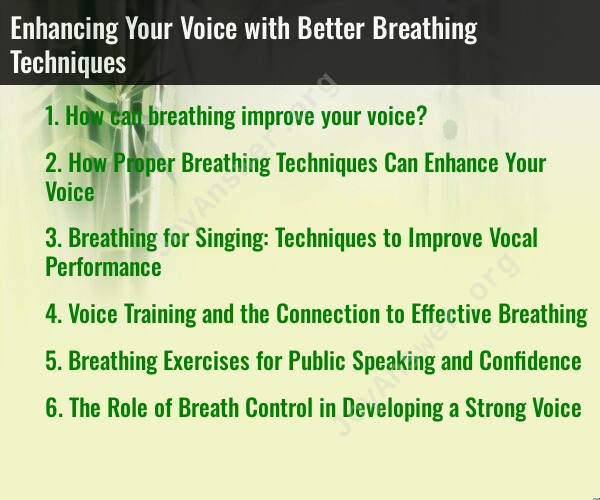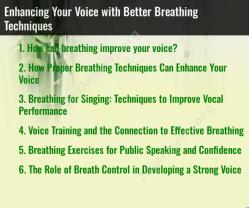How can breathing improve your voice?
Breathing plays a crucial role in improving your voice and vocal performance. By employing proper breathing techniques, you can enhance your voice in the following ways:
Sustained Vocal Power: Effective breathing provides a steady and consistent airflow to support your vocal cords. This allows you to produce a more powerful and sustained voice without straining.
Increased Vocal Range: Good breath control enables you to explore and expand your vocal range. Adequate breath support allows you to reach higher notes and sing or speak more comfortably in lower registers.
Enhanced Vocal Resonance: Proper breathing can create resonance in your vocal tract, giving your voice a richer and warmer quality. This resonance improves the timbre and projection of your voice.
Improved Vocal Endurance: Efficient breathing techniques reduce vocal fatigue, enabling you to speak or sing for longer periods without tiring your voice.
Clear Articulation: Controlled breathing helps with clear articulation and pronunciation of words. You can enunciate words more precisely, making your speech or singing more intelligible.
Emotional Expression: Effective breath control allows you to convey a wider range of emotions through your voice. You can modulate your tone, volume, and dynamics to express feelings and nuances in your speech or singing.
Reduced Vocal Strain: Proper breathing prevents strain and tension on your vocal cords and throat, reducing the risk of vocal injury and hoarseness.
Here are some basic breathing techniques to enhance your voice:
Diaphragmatic Breathing: Focus on breathing from your diaphragm (the muscle below your ribcage) rather than shallow chest breathing. Inhale deeply, allowing your abdomen to expand, and exhale slowly. This technique provides better breath support for your voice.
Breath Control: Practice controlling the release of air when speaking or singing. Use your abdominal muscles to regulate the flow of breath. Avoid expelling too much air at once, which can lead to vocal strain.
Relaxation: Keep your shoulders, neck, and jaw relaxed while breathing and speaking. Tension in these areas can restrict airflow and affect your voice.
Sips of Air: Take small sips of air as needed rather than inhaling deeply before speaking or singing. This approach helps maintain a consistent flow of breath.
Warm-Up: Before using your voice extensively, warm up by practicing scales, vocal exercises, or breathing exercises. This prepares your vocal cords and respiratory system for optimal performance.
Breath Support for Singing: Singers can benefit from breath support techniques, such as the "belly breath." This involves engaging the diaphragm and lower abdominal muscles to control airflow and sustain notes.
Voice Training: Consider voice lessons or vocal coaching to learn and refine proper breathing techniques. An experienced instructor can provide guidance and feedback.
By incorporating these techniques into your vocal practice and daily communication, you can improve the quality, power, and longevity of your voice, whether for speaking, singing, or public speaking.
How Proper Breathing Techniques Can Enhance Your Voice
Proper breathing techniques can enhance your voice in a number of ways. By breathing properly, you can:
- Increase your vocal power. When you breathe deeply and from your diaphragm, you can generate more air pressure, which will give your voice more power.
- Improve your vocal range. Proper breathing can help you to reach higher and lower notes with greater ease.
- Improve your vocal clarity. When you breathe properly, you can control your breath more effectively, which will help you to produce clearer and more resonant vowels.
- Improve your vocal endurance. Proper breathing can help you to sing for longer periods of time without getting tired.
Breathing for Singing: Techniques to Improve Vocal Performance
There are a number of breathing techniques that can help to improve your vocal performance. Some of these techniques include:
- Diaphragmatic breathing: Diaphragmatic breathing is the most important breathing technique for singers. When you breathe diaphragmatically, your diaphragm contracts, which pushes your stomach out and allows your lungs to expand. This allows you to take in more air, which will give your voice more power and support.
- Costal breathing: Costal breathing is a type of breathing that engages the muscles between your ribs. This type of breathing can be helpful for singers who are trying to increase their vocal range.
- Breath support: Breath support is the technique of using your breath to control your voice. When you support your breath, you are using your diaphragm and other muscles to create a column of air that supports your voice. Breath support is essential for singing with power and clarity.
Voice Training and the Connection to Effective Breathing
Voice training is the process of learning how to use your voice effectively. It can involve learning about vocal anatomy, vocal technique, and vocal repertoire. Voice training can help you to improve your vocal range, vocal power, vocal clarity, and vocal endurance.
Effective breathing is essential for good voice training. When you breathe properly, you are able to use your breath to support your voice and produce a clear and resonant sound.
Breathing Exercises for Public Speaking and Confidence
Proper breathing techniques can also be helpful for public speaking. By breathing properly, you can:
- Reduce anxiety and nervousness.
- Project your voice more effectively.
- Speak more clearly and concisely.
Some breathing exercises that can be helpful for public speaking include:
- Diaphragmatic breathing: Diaphragmatic breathing can help to reduce anxiety and nervousness by slowing down your heart rate and deepening your breathing.
- Humming: Humming can help to warm up your vocal cords and improve your vocal resonance.
- Tongue trills: Tongue trills can help to loosen up your tongue and improve your articulation.
The Role of Breath Control in Developing a Strong Voice
Breath control is essential for developing a strong voice. When you have good breath control, you are able to:
- Sing with more power and volume.
- Sing with better pitch and intonation.
- Sing with more expression and dynamics.
There are a number of exercises that you can do to improve your breath control. Some of these exercises include:
- Sustaining notes: Practice sustaining notes for as long as possible. This will help you to develop your lung capacity and improve your breath control.
- Singing scales: Practice singing scales while focusing on maintaining good breath support.
- Singing songs: Practice singing songs while paying attention to your breath control.
By practicing these exercises, you can develop better breath control and improve your voice.


